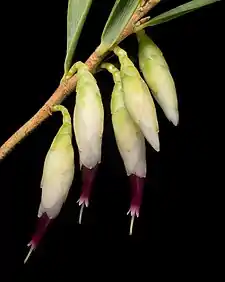Conostephium minus
Conostephium minus, common name pink-tipped pearl flower, is a shrub in the Ericaceae family,[2] endemic to Western Australia.[1]
| Conostephium minus | |
|---|---|
.jpg.webp) | |
| Scientific classification | |
| Kingdom: | Plantae |
| Clade: | Tracheophytes |
| Clade: | Angiosperms |
| Clade: | Eudicots |
| Clade: | Asterids |
| Order: | Ericales |
| Family: | Ericaceae |
| Genus: | Conostephium |
| Species: | C. minus |
| Binomial name | |
| Conostephium minus | |
| Synonyms[1] | |
|
Conostephiopsis minor Stschegl. | |
Description
Conostephium minus grows to heights from 15 cm to 75 cm.[2] The ovary is hairy in its upper half, or sometimes throughout. The exposed portion of the corolla tube is purple, and the filaments are inserted roughly in the middle of the corolla tube. The inflorescence axis is 2.1 to 3.4 mm long, with the longest sepals being 5.6 to 7.2 mm long and the corolla lobes 0.3 to 1.0 mm long, and it is these differences in lengths which differentiate Conostephium magnum from Conostephium minus.[3]

Taxonomy and naming
The species was described and named by John Lindley in 1839 in A Sketch of the Vegetation of the Swan River Colony.[4][5] The specific epithet, minus, is a latin adjective meaning "small".[6]
Distribution and habitat
Conostephium minus occurs on undulating sandplains on White/grey or yellow sands, in Beard's South-West Province.[2]
References
- "Conostephium minus Lindl. | Plants of the World Online | Kew Science". Plants of the World Online. Retrieved 2021-01-06.
- "Conostephium minus". FloraBase. Western Australian Government Department of Parks and Wildlife.
- M Hislop (2013). "A taxonomic update of Conostephium (Ericaceae: Styphelioideae: Styphelieae)" (PDF). Nuytsia. 23: 317. ISSN 0085-4417. Wikidata Q100730582.
- "Conostephium minus". Australian Plant Name Index (APNI), IBIS database. Centre for Plant Biodiversity Research, Australian Government.
- Lindley, J. (1839). A Sketch of the Vegetation of the Swan River Colony. pp. xxv.
- "minus,-a,-um". www.plantillustrations.org. Retrieved 2021-01-06.